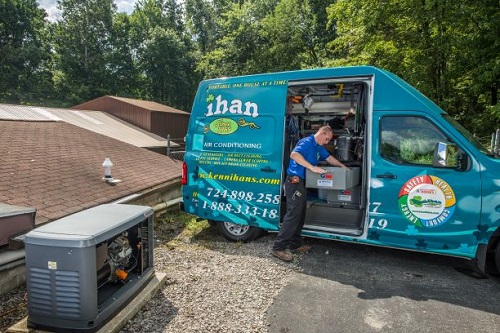No matter where you live, you likely face the possibility of a power outage due to inclement weather. Some power outages only last for a few hours, but others can last for days and even weeks. In the winter, this can mean your pipes, freezing, your food going bad, and your basements flooding.
Fortunately, there’s an easy way to avoid the common problems that come with power outages. That solution is a whole-house generator. Whole-house generators come in all shapes and sizes so they can meet your needs no matter what size your house is. Learn more about choosing the right size generator for your house.
Generator Wattage
It’s not actually the size of your home that matters when it comes to your choosing a generator. It’s actually the type and number of appliances you have in your home. If you have a lot of electronic devices and appliances, you may need a higher wattage level. Ideally, do you want to choose a generator that can run all of your appliances without a problem so that you don’t have to pick and choose. Keep in mind that this can include your water heater, HVAC unit, dishwasher, washer and dryer, and even your microwave.
Even within wattage, there are three different considerations. First, you want to think about the starting wattage, which is how much energy is needed for your appliance to turn on the first time. Then there is running wattage, which is also sometimes called rated wattage. This is the amount of energy that your appliances need to continue running. Finally, there is surge wattage. This is the largest amount of wattage that your generator is able to produce. If you want your generator to power all of your household appliances, you actually want to increase the wattage by 1000 to 2000 watts in the case of a power surge if everything starts up at once.
Measuring Required Energy
Unfortunately, it’s not as simple as just choosing wattage. Experts measure wattage using amps and volts. Amps are a way to measure a charge’s strength, while volts measure how the charge moves from one point to another. When you combine these two things together, you get the wattage. The good news is, you don’t have to understand all of this yourself. We have a team of experts that can do the math between all your different electrical systems and come up with the right generator size for your home and needs. We can explain it all to you so that you understand the investment you’re making.
You may be tempted to get a much bigger generator than you actually need. This is not always a good idea. A generator that is too large can lead to spending more on fuel costs for operation. Yet, if your generator is too small, you run the risk of it overheating as it tries to produce more energy than it is rated for.
Contact Kennihan Plumbing & Heating, Inc. today to schedule an appointment with our professionals. We treat your home like it’s our grandma’s home.

